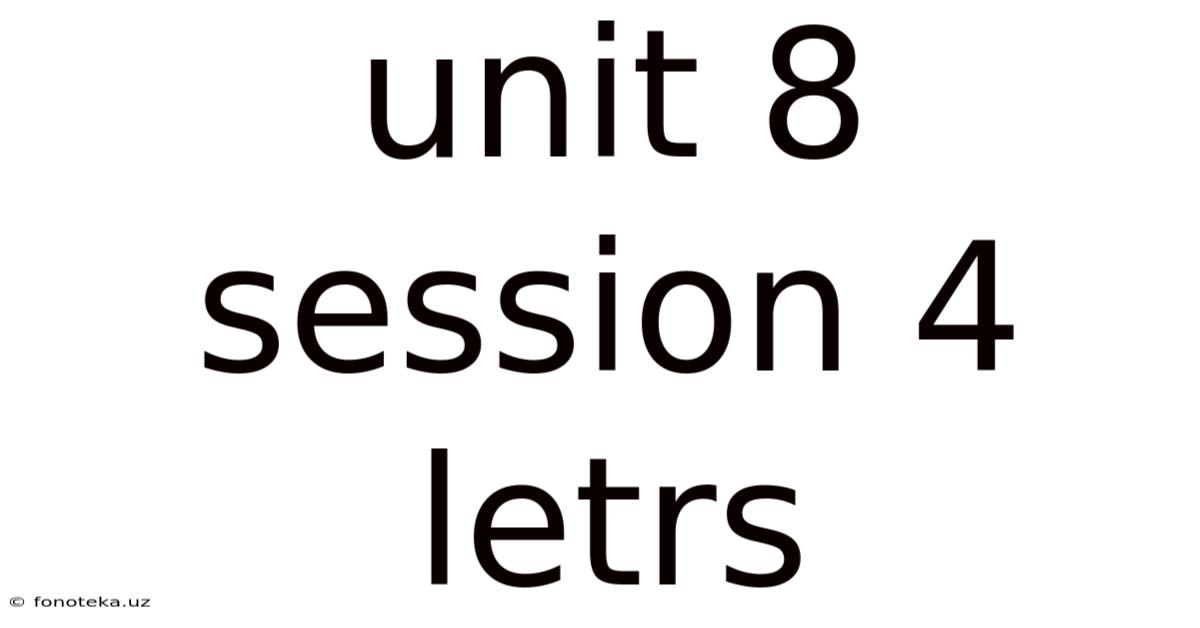Unit 8 Session 4 Letrs
fonoteka
Sep 19, 2025 · 4 min read

Table of Contents
I cannot find any publicly available information regarding a specific curriculum or course titled "Unit 8 Session 4 LETRS." LETRS (Language Essentials for Teachers of Reading and Spelling) is a widely used professional development program for educators, but its specific content is proprietary and varies depending on the version and session. There is no publicly accessible database that outlines the content of each specific unit and session.
To write a comprehensive article about "Unit 8 Session 4 LETRS," I would need access to the official LETRS curriculum materials. Without that access, I cannot provide an accurate and detailed explanation of the content.
However, I can offer a general discussion of topics likely covered in advanced LETRS sessions, assuming "Unit 8 Session 4" falls within a later stage of the program. This discussion will be speculative, but based on the general principles and scope of LETRS.
Likely Topics in an Advanced LETRS Session (Speculative)
Assuming "Unit 8 Session 4 LETRS" is an advanced session, the content might focus on more complex aspects of reading and spelling instruction. Possible topics could include:
H2: Deepening Understanding of Phonological Awareness and Phonics
- Advanced Phonics Patterns: A focus on less frequent or more complex phonics patterns, such as vowel digraphs and diphthongs in less predictable contexts, consonant clusters, and multisyllabic word decoding.
- Morphological Awareness: Moving beyond basic phonics to understanding morphemes (meaning units) and how they contribute to word meaning and spelling. This includes prefixes, suffixes, and root words. This would build upon earlier sessions which introduced foundational concepts.
- Etymological Understanding: Exploring word origins and how they relate to meaning and spelling. Understanding the historical development of words can significantly improve reading comprehension and vocabulary.
- Differentiating Instruction for Advanced Learners: Strategies for challenging students who have mastered basic phonics and need enrichment activities to further develop their skills.
H2: Reading Fluency and Comprehension Strategies
- Fluency Beyond Rate: Advanced sessions might address the nuances of fluency, emphasizing prosody (expression, intonation, phrasing) and accuracy as crucial components alongside reading rate.
- Strategic Reading Approaches: Instruction focusing on metacognitive strategies for comprehension, such as predicting, questioning, visualizing, summarizing, and monitoring comprehension. This section could delve into specific comprehension strategies tailored for different text types and complexity levels.
- Developing Vocabulary and Background Knowledge: Exploring techniques for expanding students' vocabulary and building background knowledge to improve reading comprehension. This could include explicit vocabulary instruction, using graphic organizers, and connecting reading to prior knowledge.
- Close Reading and Text Analysis: Developing skills in analyzing complex texts, including identifying main ideas, supporting details, author's purpose, and different literary devices.
H2: Addressing Reading Difficulties in Older Students
- Dyslexia and Other Reading Disabilities: A more in-depth exploration of various reading disabilities and the specific instructional interventions required. This could include differentiated instruction to meet the unique needs of students with reading challenges.
- Multi-Tiered Systems of Support (MTSS): Applying MTSS frameworks to identify, support, and intervene with students who are struggling with reading. This could involve implementing interventions at various levels of intensity depending on the student's needs.
- Assessment and Data-Driven Instruction: Using data from assessments to inform instructional decisions and monitor student progress. This might involve analyzing student performance data to adjust teaching methods and provide tailored support.
H2: Writing Instruction and the Connection to Reading
- The Writing Process: A thorough examination of the writing process, emphasizing prewriting, drafting, revising, editing, and publishing. This would connect writing instruction to reading comprehension skills.
- Grammar and Mechanics: Connecting grammar and mechanics instruction to reading comprehension and vocabulary development. This might focus on how grammatical structures impact meaning and how understanding grammar can enhance writing and comprehension.
- Spelling Development: A more advanced understanding of spelling patterns and strategies for teaching spelling, including morphological analysis and etymological understanding.
H2: Technology and Assessment in Reading Instruction
- Utilizing Technology: Exploring various technology tools and resources that can be used to support reading instruction. This might involve using digital tools for assessment, differentiated instruction, or providing access to diverse texts and activities.
- Formative and Summative Assessment: A more in-depth look at different assessment methods and their use in monitoring student progress and making instructional decisions. This could involve discussions about the benefits and limitations of different assessment tools.
H2: Conclusion: The Importance of Ongoing Professional Development
Without specific details about the content of "Unit 8 Session 4 LETRS," this is a generalized overview of the types of topics likely covered in advanced sessions of the program. LETRS emphasizes a scientific approach to reading instruction, focusing on the importance of phonological awareness, phonics, fluency, vocabulary, and comprehension. Advanced sessions likely build upon these foundational concepts, exploring more complex aspects of reading and writing instruction, including addressing the needs of diverse learners and leveraging technology to enhance learning. The ultimate goal is to equip educators with the knowledge and skills to effectively teach all students to read and write proficiently. Remember that ongoing professional development is crucial for teachers to stay current with research-based best practices in literacy instruction.
Latest Posts
Related Post
Thank you for visiting our website which covers about Unit 8 Session 4 Letrs . We hope the information provided has been useful to you. Feel free to contact us if you have any questions or need further assistance. See you next time and don't miss to bookmark.